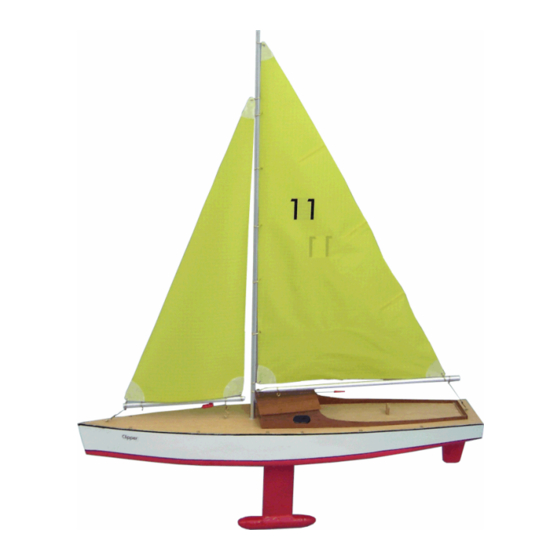
Clipper
Cut the glasspaper 62 to the size of the plywood block 61, and glue it to both sides. Carefully press
the components out of the die-cut sheets and sand the edges smooth using the sanding block.
1) Mask off the edge of the channeled face of the deck 1 using adhesive tape to avoid soiling the deck
surface when glue is applied. Cover the work surface with plastic film, and lay the deck 1 on it, chan-
neled face down. Insert the keel 2 in the slot, and place the bulkheads 3 to 8 on the deck 1.
2) Insert the keel components 9 and 10. Check that the keel 2 is exactly central.
3) Glue all the assembled parts together at the corners.
4) Sand the front of the bow 11 to a point on both sides (red area) to match the shape of the deck 1,
and glue it to the deck 1 and the bulkhead 3. Ensure that part 11 is exactly vertical and central. Glue
the bulkhead 12 to the deck 1 and to the keel 10. Pin parts 11 and 12 in place while the glue is drying.
5) Allow the glued joints to set hard.
6) Sand the balsa strips 13 at an angle as shown in the full-size plan view, glue them to the bow 11
and allow the glue to harden. Don't glue them to bulkhead 3 at this point!
7) When the glue has set, stick the balsa strips 13 to bulkheads 3 to 8 and 12, again using pins to hold
them in position. Ensure that the bow 11 remains straight when you curve the strips 13.
8) Fit the mast socket 14 through the deck 1 and into the hull. Part 14 must end flush with the top sur-
face of the deck 1.
9) Set the mast socket 14 exactly central relative to the keel 9. Glue a piece of the 3 cm wide fabric
tape 23 over both sides of the mast socket 14 and the keel 9. Glue the mast socket 14 to the deck 1.
10) Glue the two reinforcements 15 to the deck 1, butting up against the rear of the bulkhead 12.
11) Glue the hull sides 16 to the structure, aligning them with the bow 11 and the bulkhead 12. Clamp
the sides to the balsa strips 13 using clothes pegs. If there is a gap between the deck 1 and the hull
side, tape the ply panel to part 1 while the glue is setting.
12) Check that the notches in parts 17 + 18 match the keel 2, and sand them to the correct size if
necessary. Glue the bottom hull panels 17 + 18 to the structure and tape them in place; they should
finish flush with the hull sides 16.
13) This completes the basic hull structure; sand off the excess balsa strip material 13 at the bulkhead
12 so that they do not project beyond it.
14) Assemble the boatstand from parts 19, 20 and 21, and glue the joints.
15) Clean the metal ballast bulb 22 using soapy water.
16) Place the ballast bulb 22 centrally in parts 19 and 20, rounded end facing forward, pointed end aft.
Place the hull between parts 19 and 20 and glue the keel 2 centrally to the ballast bulb 22.
17) Glue a strip of 10 cm wide fabric tape 23 to the ballast bulb 22 and the keel 2 for extra strength.
18) Fit the rudder bush 25 in the hole in the bottom of the hull 17; it should project on the underside by
11 mm. Glue part 25 to the hull bottom 17 and the keel 10.
19) Glue a strip of 3 cm wide fabric tape 61 to the bush 25 and the keel 10.
Fit the shaft of the rudder 24 through the bush 25, fit a washer 26 on the top end and screw the self-
locking nut 27 onto the threaded part.
Fit the steering arm 28 on the rudder shaft, and tighten the second self-locking nut on top to clamp the
steering arm 28 in place. Check that the rudder 24 rotates freely when the steering arm 28 is moved.
20) Glue the plywood reinforcements 30 and 31 to the smooth face of the hatch cover 29, with the lugs
projecting beyond the ends of the panel. Clamp the parts together.
Fit the handle 32 through the slot and glue it in place.
The finished hatch 29 as seen from the underside.
21) Glue the hatch support rails 33 to the underside of the deck 1 at the sides, centred on the access
opening; allow the glue to set hard. The hatch 29 can now be fitted as follows: slide the wider end of
the hatch cover (with part 30) under the deck 1, press the opposite (narrow) end (with part 31) down
and then slide the hatch back. The hatch cover will now snap into place, with the lugs of parts 30 + 31
engaging under the deck 1. To open the hatch, press the wider end down into the hull by about 3 mm,
slide it forward to clear the lugs, then lift it off.
22) Tape together the superstructure components 34 to 37. Apply glue to the corner joints on the
inside.
23) Cut the windows from the clear packaging material, and glue them on the inside of the super-
structure.
24) Glue the roof 38 to the superstructure.
25) Glue the superstructure floor 34 to the deck 1, leaving a visible gap about 1 mm wide between the
wall 35 and the access opening in the deck 1.
2
Clipper building instructions
